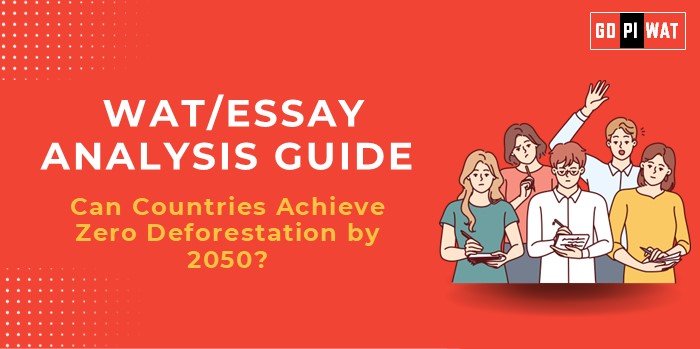🌳 Written Ability Test (WAT)/Essay Analysis Guide: Can Countries Achieve Zero Deforestation by 2050?
🌍 Understanding the Topic’s Importance
Zero deforestation is a cornerstone in combating climate change, preserving biodiversity, and advancing sustainable development. For B-school essays, this topic showcases the candidate’s ability to connect global sustainability goals with actionable business and policy strategies.
⏳ Effective Planning and Writing
- Time Allocation:
- 📝 Planning: 5 minutes
- ✍️ Writing: 20 minutes
- 🔍 Review: 5 minutes
- Preparation Tips:
- Identify key drivers of deforestation, such as agriculture and mining.
- Incorporate case studies like Brazil’s Amazon monitoring or Costa Rica’s Payment for Ecosystem Services (PES) program.
✍️ Introduction Techniques
- Contrast Approach: “While nations pledge zero deforestation, global forest loss continues at alarming rates, questioning the feasibility of such commitments.”
- Solution-Based: “Achieving zero deforestation requires innovative solutions, from sustainable farming to international collaborations.”
- Timeline Approach: “From the Kyoto Protocol to COP26, the world has long sought to end deforestation, but the path to zero remains challenging.”
📚 Structuring the Essay Body
- Achievements:
- 🌳 Success stories such as Brazil’s reduction of Amazon deforestation by 80% between 2004–2012.
- 🌎 Costa Rica’s PES model, which doubled its forest cover.
- 🌱 Corporate accountability through certifications like FSC (Forest Stewardship Council).
- Challenges:
- 💸 Economic reliance on industries like agriculture and logging.
- ⚖️ Lack of enforcement in developing nations with fragile governance.
- Future Outlook:
- 🤝 Collaborative frameworks like REDD+ for carbon credit financing.
- 📜 Stricter import regulations, such as the EU’s legislation against deforestation-linked commodities.
🔗 Concluding Effectively
- Balanced Conclusion: “Zero deforestation, though ambitious, is achievable through combined efforts of policy, technology, and economic incentives.”
- Global Comparison Conclusion: “Learning from nations like Costa Rica and Norway, the world can pivot toward sustainable forest management.”
💡 Recommendations for Sustainable Progress
- 📡 Strengthen global monitoring using AI and satellite technologies.
- 👥 Promote alternative livelihoods for communities dependent on deforestation-related activities.
- 💰 Expand financial incentives for conservation through carbon credit programs.
✏️ Sample Short Essays
1. Balanced Perspective:
“Achieving zero deforestation by 2050 is an ambitious goal. Countries must address economic dependencies and weak enforcement while leveraging technology and international frameworks to reduce forest loss significantly.”
2. Solution-Oriented:
“Innovative measures like sustainable farming, carbon credits, and international collaboration can make zero deforestation a reality by 2050.”
3. Global Comparison:
“Learning from Norway’s preservation funding and Costa Rica’s PES model, nations can balance economic development with forest conservation.”


